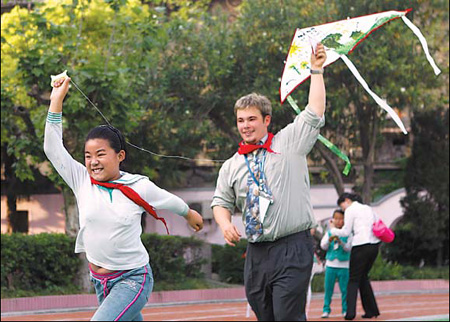Migrant children face education divide
 |
|
Migrant children at a primary school in Shanghai's Hongkou district fly kites with foreign students who were visiting the city, in this file photo taken last year. Gao Erqiang / China Daily |
When Wang Zefang arrived for his first class at Gaojin No 3 Middle School two years ago, he was among thousands included in Shanghai's trailblazing plans to integrate children of migrant workers into free mainstream education.
Before then, State-run and public schools were closed to families without hukou (permanent residency), forcing them to pay for their children to attend private but poor institutes.
Yet, despite being taught alongside his native peers, 16-year-old Wang is under no illusion that the invisible fence between them has been knocked down.
Of the 300 migrant children who arrived at the Baoshan district school in 2008, Wang was one of a handful admitted into regular classes. The others are housed in a separate school building, wear an alternative uniform and have different teachers and textbooks. Even meal times and finishing times are different.
"I feel distinct discrimination against us, it has just been brought inside the school walls," said Wang, who had to pass an exam to be accepted into the main school.
Teachers warned his class to stay clear of the migrant children, describing them as "wild", "lacking in manners" and "poor".
"Because of the divide, I have not talked to any students in the other building all semester," he said, adding that he can imagine "how sad they must feel facing such segregation on a daily basis".
Although Wang is one of the lucky ones, he explained that his younger sister, Wang Xuemeng, is on the other side of the fence at a public school in neighboring Yangpu district.
"The conditions are better there than the private school she used to go to but she often complains of unfair treatment and is not happy," said the concerned brother. "She says both the teachers and parents (with hukou) feel migrant worker families set a bad example, so they are not friendly towards them."
Almost 20 percent of Shanghai's population is made up of farmers who flock to the metropolis each year in search of better salaries, bringing with them more than 400,000 children.
For years under the much-maligned hukou system, migrant children have been unable to enjoy the nine years of compulsory education in their adopted homes, creating a huge demand for private schools.
However, in recent years Shanghai has been among the first Chinese cities to close such facilities - most of which suffer a lack of resources and poor standards - and enroll students at public schools as part of a nationwide campaign.
The city government also bought several decent private schools and injected more funds to improve standards.
Most of the 100 or so private schools in Baoshan district, an area popular with migrants due to its cheap housing, were shuttered by 2008, with only 16 primaries kept open to cater to 14,000 students. About 40,000 other youngsters were spread out across the district's public schools, authorities reported.
Shanghai's educational commission stated that, by the end of the year, all migrant children in the city will have access to its free compulsory education.
 0
0 






